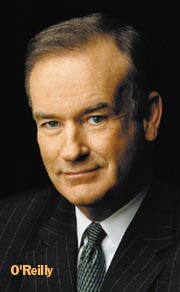|
Spurned author O'Reilly says NPR spins to left Originally published in Current,
March 25, 2002 No bias at NPR? "Aaaagggghhhh!" That's how Bill O'Reilly, host of The O'Reilly Factor on the Fox News cable channel, responded recently when a guest on his show suggested that NPR covers "all points of view." O'Reilly's response was direct and to the point, in keeping with the brisk, outspoken style of his popular nightly program. He prides himself on running what he calls a "no-spin zone" and lately has criticized NPR for spinning much too far to his left. His prime evidence? NPR fails to feature his books. He complained about the network on his show March 6, when he interviewed Steven Emerson, an author who writes about Islamic terrorism and who has appeared on many talk shows since Sept. 11. Emerson says he's a victim of an internal policy at NPR barring him from appearing on its programs. The blacklisting began in 1998, he says, when his appearance on Talk of the Nation sparked complaints from Arab groups. He says TOTN producer Ellen Silva told a listener that it was "NPR policy" not to invite him on the air again. But Bruce Drake, NPR's v.p. of news, has since said no such policy exists. Emerson's story gave O'Reilly a window to raise for a second time his personal beef with NPR--namely, that it shuns him, too. He has never appeared on the network's shows to discuss his books, The O'Reilly Factor and The No-Spin Zone. "[T]he fact of the matter is, I've had two best-selling books that have reached No. 1 on the New York Times list," he said, according to an online transcript. "I can't get on NPR, Congressman [Rep. Maurice Hinchey (D-N.Y.), a guest that night]. Does that make sense to you?" O'Reilly had already raised the complaint on his program Jan. 8, when he said "every major city, radio outlet, talk radio outlet has invited me on whether they're liberal, conservative, doesn't make any difference. . . . Not one NPR invitation." On that program, O'Reilly discussed his criticism of NPR with two former news directors from NPR, John Dinges and Adam Clayton Powell III. "Now, this is exclusionary, isn't it, gentlemen?" he asked. "And I'm a taxpayer. Part of my money's going to that $3 million [in government support] that's going in there. And I think it's an outrage." "You got the hottest author in the country [who] can't get on NPR," he said. "Is there a reason for that?" O'Reilly's guests have been divided on the matter. "I think that they should have you on," Rep. Hinchey said, but defended NPR as "fair and even-handed." Powell and Dinges conceded that NPR has sometimes fallen prey to bias or neglected some viewpoints, and Powell said he was surprised the network hadn't covered O'Reilly. But Dinges took another tack. "I don't think that everybody that does a book has the right [to get on NPR]," he said. "When I was editorial director [at NPR], we would never have let a program host spend time on his segment making this kind of a case to get his own book on somebody's media outlet." |
 |
 |
To Current's home page |
 |
Outside link: O'Reilly announces radio show, starting May 2000. |
Web page posted April 3,
2002
Current
The newspaper about public television and radio
in the United States
A service of Current Publishing Committee, Takoma Park, Md.
E-mail: web![]() current.org
current.org
301-270-7240
Copyright 2002
